Article
14 Best Software Testing Tools in 2025: Expert Overview
Explore the top software testing tools, featuring expert insights on automation, AI integration, and best practices for efficient QA processes. Read now!

[Updated November 2025]
Software testing tools are an essential part of the software development process, as they help organizations ensure that their products are of high quality and meet the requirements of their users.
There are many options available when choosing a software testing tool. Each tool has unique features and capabilities; the right choice will depend on an organization's specific testing requirements and goals. Some tools are better suited for certain types of testing or technologies, while others offer more general-purpose functionality.
Here, we take a look at 7 popular software testing tools and break down their features, drawbacks, pricing, and platform support.
1. Functionize

Functionize is a leading QA testing tool that uses AI to empower teams with end-to-end tests that self-heal and run at scale in the cloud. This allows for faster testing, lower costs, and improved quality in CI/CD environments. Its AI-powered platform creates more stable tests resulting from its unique big data approach. It also empowers teams and future-proofs skills with low-code intelligent tests, removing the need for highly technical “coders” to automate testing.
Built for modern DevOps pipelines, Functionize uses self-healing AI agents that adapt to changes in real time, eliminating the flakiness of traditional scripted tests. Its cloud-native architecture enables thousands of tests to run in parallel, dramatically reducing test cycle durations. Non-technical users can easily design and execute tests using its intuitive interface, while advanced users benefit from full customization and API access. With robust analytics, real-time reporting, and intelligent debugging, Functionize helps QA teams shift left, catch issues earlier, and accelerate software delivery without sacrificing quality.
- AI at scale: Industry-leading ML powers fast, stable testing across complex workflows.
- Self-healing tests: Tests update automatically when your UI changes.
- Cloud-native execution: Run thousands of tests in parallel. Get fast feedback.
- Low-code interface: Anyone can build tests. No deep coding skills needed.
- Full test coverage: Catch issues early with end-to-end application testing.
- Stable and smart: Fewer flaky tests. Automation learns how your app behaves.
- CI/CD ready: Fits seamlessly into your existing pipeline.
- EAI agents: Autonomous agents adapt to your team and boost output.
- Top-tier support: Expert help at every stage of your automation journey.
- Faster releases, less test debt: Ship quicker. Maintain less. Focus on innovation.
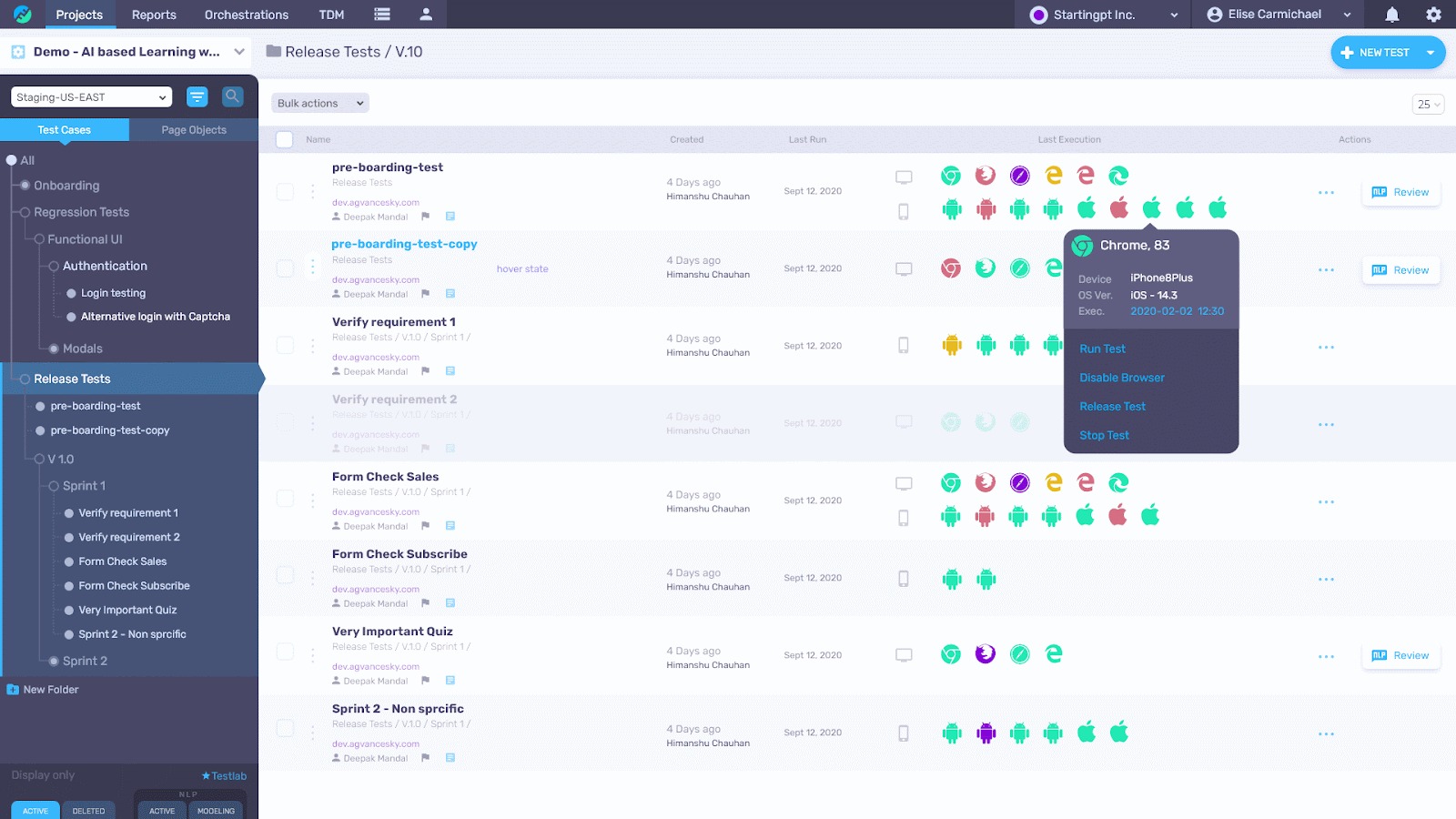
Drawbacks
- Might be overwhelming for some!
Platform
- Web-based
Customer ratings:
Capterra reviews:/ ,Capterra rating:/
Features Valued by Users on Capterra or G2
- AI-driven test automation for web, mobile, and APIs.
- Self-healing tests reduce maintenance efforts.
- Visual validation ensures UI consistency.
- Real-time monitoring with detailed dashboards.
- CI/CD integration with Jenkins and GitHub.
- Alerts and notifications for test failures.
2. Autify

Autify is a no-code, intuitive UI-based software testing tool that allows anyone to build tests easily by interacting with an application as a user would. It maximizes test frequency and coverage by allowing users to run 10 cross-browser tests simultaneously. Designed for both web and mobile applications, Autify helps teams automate regression testing without writing complex scripts. Its AI engine automatically detects UI changes and updates test scenarios. Test cases can be recorded through a browser, edited through an easy interface, and reused across environments. Autify is accessible to non-technical users while remaining powerful enough for engineering teams. Built-in collaboration features help align QA efforts across product and development teams. With its cloud-based infrastructure, Autify supports parallel testing at scale and integrates with CI/CD pipelines.
- AI maintains test scenarios
- Cross-browser testing on both PC and mobile browsers
- Email testing, including transition tests and checking email content
- JavaScript Step for limitless customizability with coding
- Parallel execution, with a customizable number of parallel tests
- Step Groups for bundling sets of actions and Local Replay for testing on the browser environment
- Integration with popular services such as CircleCI, Jenkins, Webhook, TestRail, and Slack
- Shadow DOM support and Visual Regression testing

Drawbacks:
- Some users have noted a desire for additional options for user roles and more control over customizing certain metrics.
- There is a lack of self-tutorial videos to help familiarize users with the tool.
- Integrations are limited to a few tools like Jira and Slack; more options would improve flexibility.
- Managing complex data, like pricing or quotes, can be difficult in production environments.
- Doesn’t support dynamic element handling, which can limit test coverage.
- Reusable test group features are lacking, making test management harder for large projects.
Pricing:
- Autify offers a 14-day free trial for users. Paid options include the Starter plan for $99.00 per month, the Pro plan for $450.00 per month, and the Enterprise/Custom plan, which is customizable to fit any use case.
Platform:
- Autify supports web and mobile browsers and allows you to run tests on multiple browsers simultaneously.
Customer ratings:
G2 reviews: 12, G2 rating: 4.8
Capterra reviews: 3, Capterra rating: 5
Features Valued by Users on Capterra or G2
- No-code test creation for non-technical users.
- Supports web and mobile app testing.
- Auto-healing tests adapt to UI changes.
- Parallel test execution for faster results.
- Integrates with GitHub, Slack, and CI/CD tools.
- Detailed analytics and test reports.
3. QA Wolf

QA Wolf is a comprehensive end-to-end testing platform that helps you achieve 80%+ coverage in four months or less. It integrates into the development workflow and delivers clear, actionable results. The platform is built on Microsoft’s Playwright and uses a Kubernetes backend to run tests in parallel using headful browsers inside Docker containers. Users can access the platform to review test code, check failure logs, and request additional test coverage. The platform supports continuous testing without requiring internal QA automation resources.
- Automated visual testing
- Test management
- Reports and analytics
- Integrations with popular testing frameworks
- Comprehensive test plan that is tailored to your app
- An expert team of QA engineers that work with you to build out coverage
- Failure triaging and test maintenance to ensure pure, actionable signal
- High-quality bug reports with repro steps, video recordings, and logs
- Ultra-fast parallel test run infrastructure
- Flexible integration options
- A dedicated team and easy-to-use app
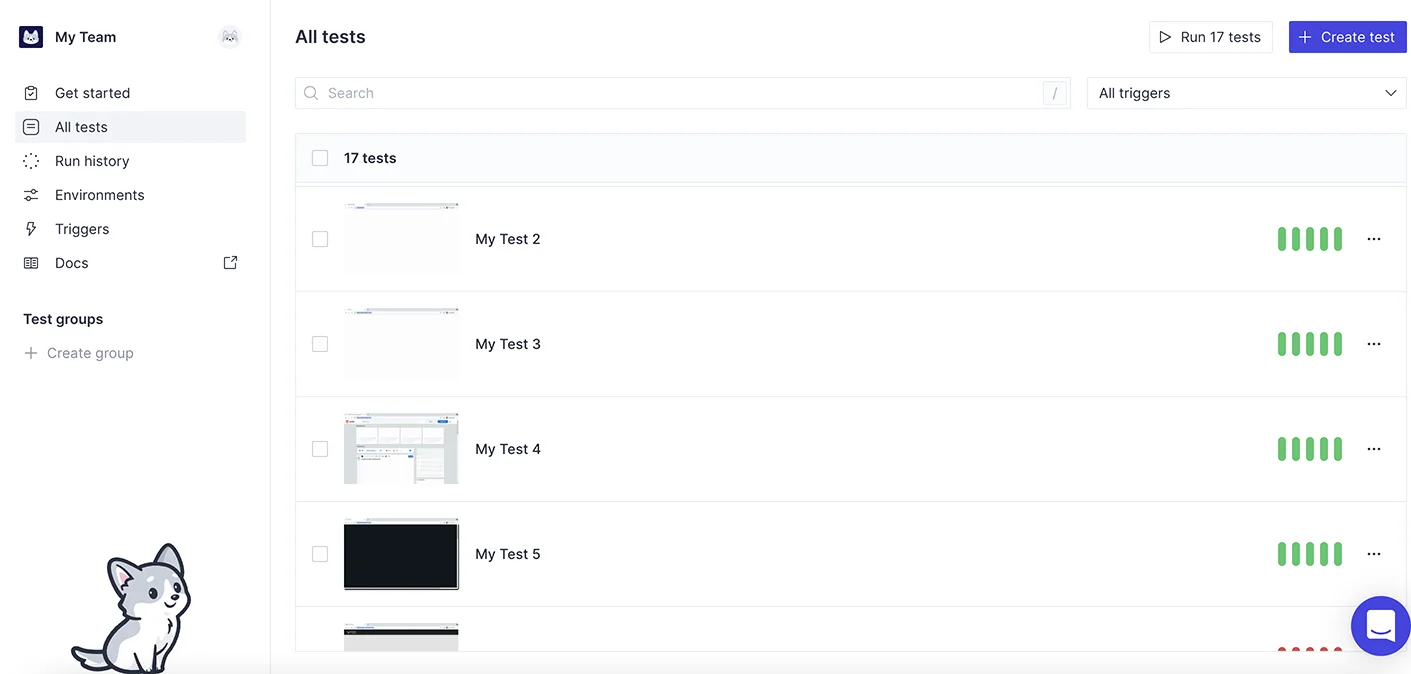
Drawbacks:
- QA Wolf currently lacks support for certain browser actions, such as using the back and forward buttons, handling file uploads and downloads, and interacting with drag and drop and iFrames.
- Pricing can be high, especially for growing teams with expanding test suites.
- All tests are managed by QA Wolf’s team, which can reduce visibility into the software for internal teams.
- The text editor for coverage requests is basic and lacks features like image attachments.
- Full regression runs can take a long time, especially with complex product setups.
- Limited parallel testing may slow down execution in certain cases.
Pricing:
- QA Wolf offers flexible pricing options and can work with you to create a custom plan that fits your needs. They offer a free trial.
Platform:
- QA Wolf supports web-based applications and has no official support for mobile platforms.
Customer ratings:
G2 reviews: 136, G2 rating: 4.8
Capterra reviews: 43, Capterra rating: 5
Features Valued by Users on Capterra or G2
- Automatically generates test scripts from user actions.
- Supports cross-browser testing (Chrome, Firefox).
- Self-healing tests minimize maintenance.
- CI/CD integration with GitHub Actions.
- Visual debugging for easy issue resolution.
- Fast test execution for rapid feedback.
4. testRigor

testRigor is a tool that allows users to create tests using plain English, resulting in faster test automation and less time spent on maintenance. It’s designed to simplify the testing process and reduce reliance on complex coding. With testRigor, users describe actions in natural language, and the platform translates them into automated tests. The platform supports web, mobile, and desktop applications. testRigor also uses AI to adapt to UI changes, reducing test flakiness and minimizing the need for manual updates. It integrates with CI/CD pipelines, enabling continuous testing and faster releases. Test results are presented clearly, with logs and screenshots to assist in debugging.
- Test creation in plain English.
- Extensive browser support on desktop and mobile platforms.
- 2FA login support, including login with email, text messages, and Google Authenticator
- API testing, mocking of API calls, and data-driven testing with datasets support, including data from CSVs.
- Validation of downloaded files, Word, Excel, PDF, and CSV files.
- Testing of Chrome Extensions.
- Reusable Rules allow grouping steps into functions with arbitrary names.
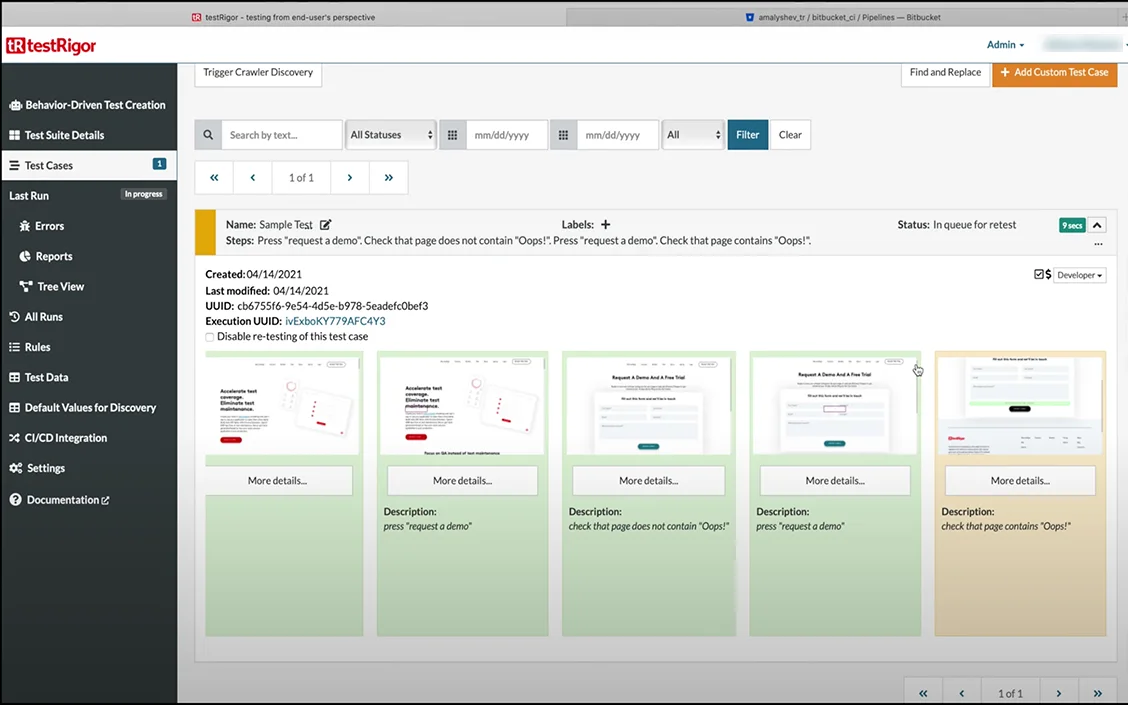
Drawbacks:
- Some aspects of the user experience (UX) are currently under development. There may be fewer pre-built integrations available compared to other solutions. Some competitors offer live help and a customer success manager at the medium pricing tier, which is not currently offered by testRigor.
- It lacks built-in educational materials, which can make it harder for teams without strong QA experience to get started.
- Users often need to rely on external spreadsheets to manage large test suites, as the platform's test management features are limited.
- Organizing and scaling tests becomes difficult as the number of test cases grows.
- There are known issues with Android native apps, including trouble recognizing fields and dropdowns.
- In some cases, the tool only detects the first input field and repeats all actions there, causing test errors.
- Native app support is limited, which affects usability for mobile testing teams.
Pricing:
- TestRigor has a simple pricing model that only charges for the infrastructure used to execute tests in parallel. The more parallelizations purchased, the faster tests will be executed, and there are no additional charges for the number of users or executions.
Platform:
- TestRigor supports web testing on desktop and mobile browsers on multiple operating systems, mobile testing on physical devices, and testing of hybrid apps.
Customer ratings:
G2 reviews: 16, G2 rating: 4.6
Capterra reviews: 5, Capterra rating: 4.6
Features Valued by Users on Capterra or G2
- No-code test creation using plain English.
- Supports web, mobile, and API testing.
- Auto-healing tests for dynamic applications.
- Parallel execution for efficient testing.
- Integrates with Jenkins and GitHub.
- Visual test recording for easy setup.
5. Kobiton

Kobiton is a mobile-first testing platform that enables enterprises to deliver faster release cycles and exceptional user experiences. It supports both manual and automated testing across real devices in the cloud. Teams can run tests using popular frameworks like Appium and Selenium WebDriver without needing to install SDKs or additional setup. Kobiton allows developers to test mobile and web apps in their preferred programming languages, removing the need to learn new scripting methods. Kobiton also integrates with CI/CD pipelines to support continuous testing. Built-in test session management, logs, and video recordings make it easy to identify and debug issues. Kobiton also offers responsive support and reliable performance for enterprise teams.
- Automated visual testing
- Test management
- Reports and analytics
- Integrations with popular testing frameworks
- Testing on real devices for comprehensive coverage
- Automation at scale with scriptless technology
- Support for different platforms like XCUI, Espresso, Appium, Selenium, and more
- Identification and resolution of performance issues quickly with robust session explorer
- True mobile continuous testing, automatic self-healing test scripts, and integration into all CI/CD platforms for seamless integration into your workflow.
- Advanced session explorer with detailed device and app performance metrics
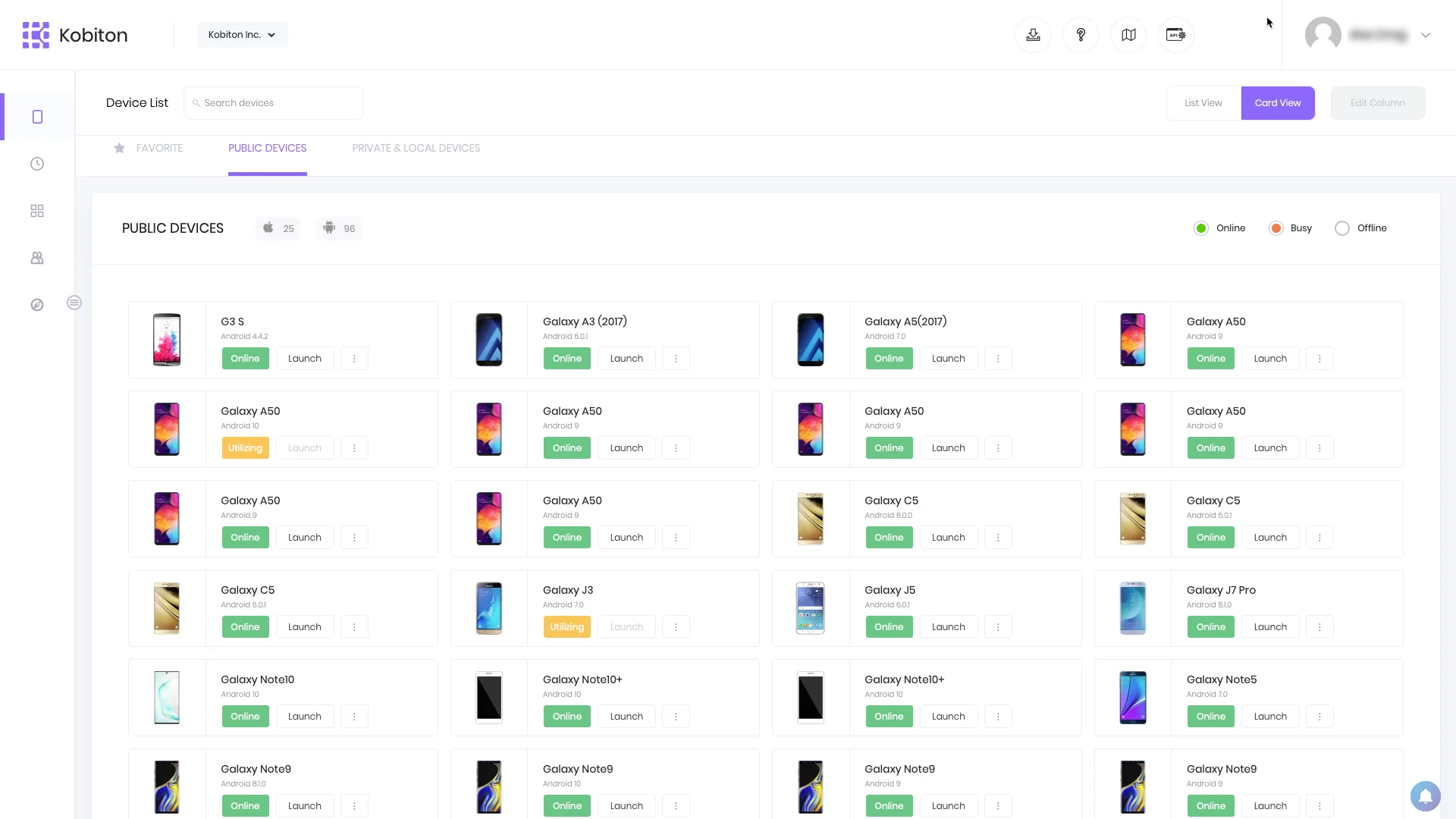
Drawbacks:
- There are limitations regarding access to Beta versions and managing devices and groups through the UI. In addition, it does not support delayed test runs and can encounter issues with the health of public cloud devices, resulting in random test failures.
- Reporting features are limited. Usage data by user or month isn't always available without contacting support.
- Device speed and connectivity can be slow at times.
- Switching between devices is not seamless and may require waiting for the system to register availability.
- It's not possible to take screenshots directly within the platform. Users must rely on their own computers.
- Initial device setup and navigation can be confusing for new users, especially when working with multiple devices.
Pricing:
- Kobiton offers 3 main pricing plans: Start Up, Accelerate, and Scale. The Start-Up plan costs $75 per month, and the Accelerate plan costs $390 per month. The Scale plan is annual only.
Platform:
- Kobiton supports testing on various mobile devices and platforms, including iOS, Android, Windows, and macOS.
Customer ratings:
G2 reviews: 37, G2 rating: 4.3
Capterra reviews: 22, Capterra rating: 4.3
Features Valued by Users on Capterra or G2
- Real device testing for iOS and Android.
- Session replay and video recording for debugging.
- Parallel testing for faster execution.
- CI/CD integration with Jenkins and Bamboo.
- Test flakiness detection and reporting.
- Supports Appium for automation.
6. Testsigma

Testsigma is an open-source test automation platform that enables users to build end-to-end tests 5X faster for web, mobile apps, and APIs. It's a fully customizable, unified platform that works out of the box. Testsigma supports a wide range of platforms, including Android, iOS, and web. With its natural language approach, even non-technical users can write and execute tests. The platform is cloud-based, so teams can test across environments without needing local infrastructure. Testsigma also offers version control, parallel test execution, and real-time debugging. Its integrations with CI/CD tools and collaboration platforms support continuous testing and faster feedback loops. Teams can reuse test cases, manage test data easily, and track performance across builds.
- Automated visual testing
- Test management
- Reports and analytics
- Integrations with popular testing frameworks
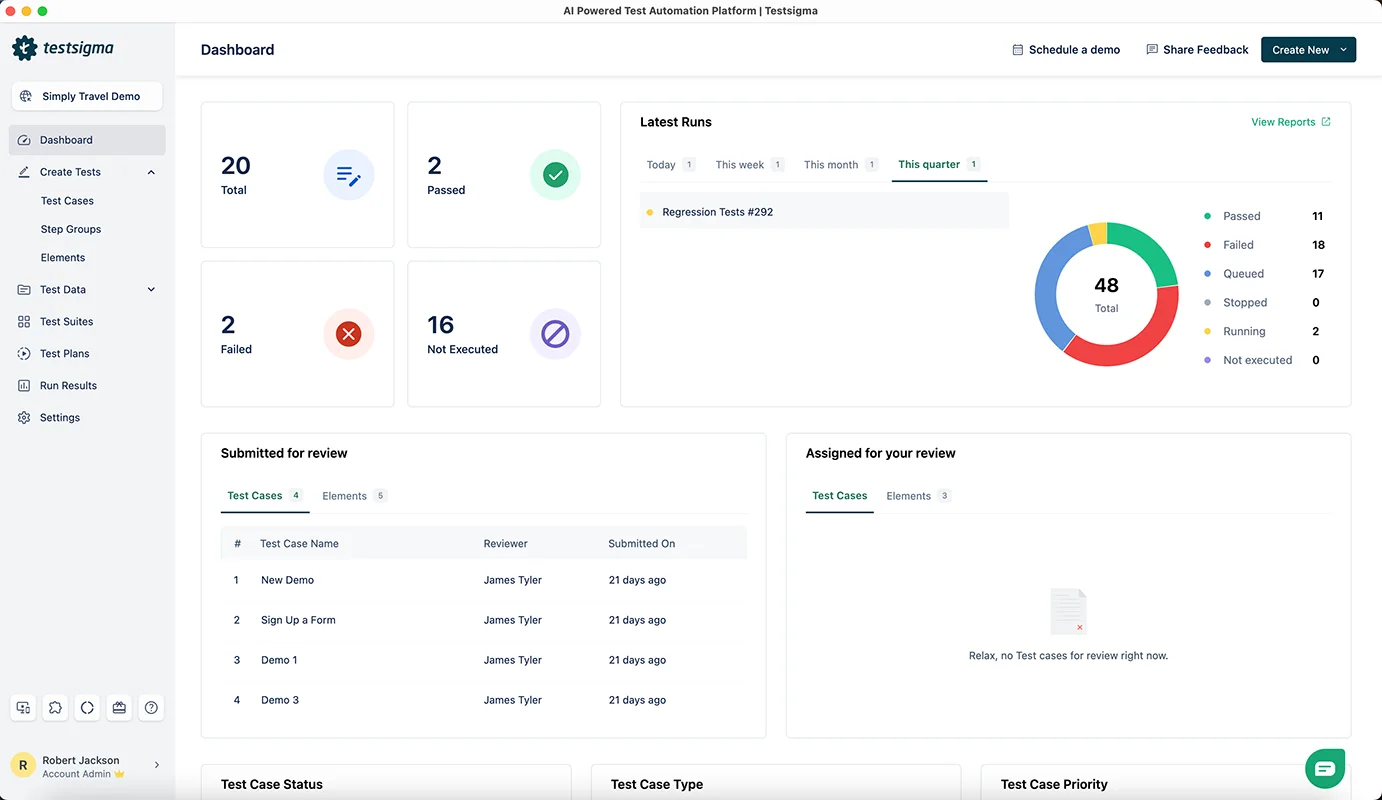
Drawbacks:
- TestSigma has some limitations in terms of linking test suites and consistency in test cases, as well as the clarity of reports. Some users may experience difficulty accurately identifying elements due to the product's limitations or a complex DOM. Additionally, there may be a lack of full-page screenshots in some browsers.
- Some users may find the initial setup overwhelming, especially if they’re new to automation tools.
- Debugging locally could be improved; error messages and logs aren’t always detailed enough.
- Testsigma can sometimes return false negatives due to timing issues or dynamic elements.
- Test stability may require ongoing tuning and manual adjustments.
- Execution speed for large test suites or cloud-based runs can be slower than script-based tools.
- Technical expertise is still needed for more complex test scenarios.
Pricing:
- Testsigma offers 3 pricing plans: Testsigma CE, which is open-source and free, PRO, which is $349/month, and ENTERPRISE, which is custom-priced.
Platform:
- Testsigma supports web and mobile app testing on a variety of browsers and devices, including desktop browsers, iOS, and Android devices, and APIs.
Customer ratings:G2 reviews: 48, G2 rating: 4.4
Capterra reviews: 19, Capterra rating: 4.3
Features Valued by Users on Capterra or G2
- NLP-based test creation for non-coders.
- Supports web, mobile, and API testing.
- Auto-healing tests for reliability.
- Parallel execution for speed.
- CI/CD integration with Jenkins and GitHub.
- Comprehensive test reporting.
7. Kualitee

Kualitee is a test management platform that offers integrations with various tools you already use. This allows for efficient systemization and management of defects and execution of functions. Teams can plan test cycles, execute test cases, log defects, and track results in one place. Kualitee supports both manual and automated testing, giving teams flexibility based on their project needs.
The platform includes strong traceability features that link requirements, test cases, and defects, making it easier to identify gaps and resolve issues quickly. Its AI feature, Hootie, helps generate test cases based on user stories. Kualitee also offers both cloud-based and on-premise deployment options to meet different security and infrastructure needs.
- Integration with multiple tools such as Asana, GitLab, JIRA, Redmine, Selenium, GitHub, Jenkins, Azure DevOps, Automation Reports, ClickUp, Trello, Teamwork, and Linear.
- Collaboration and team management
- Integration with Selenium and other automation frameworks
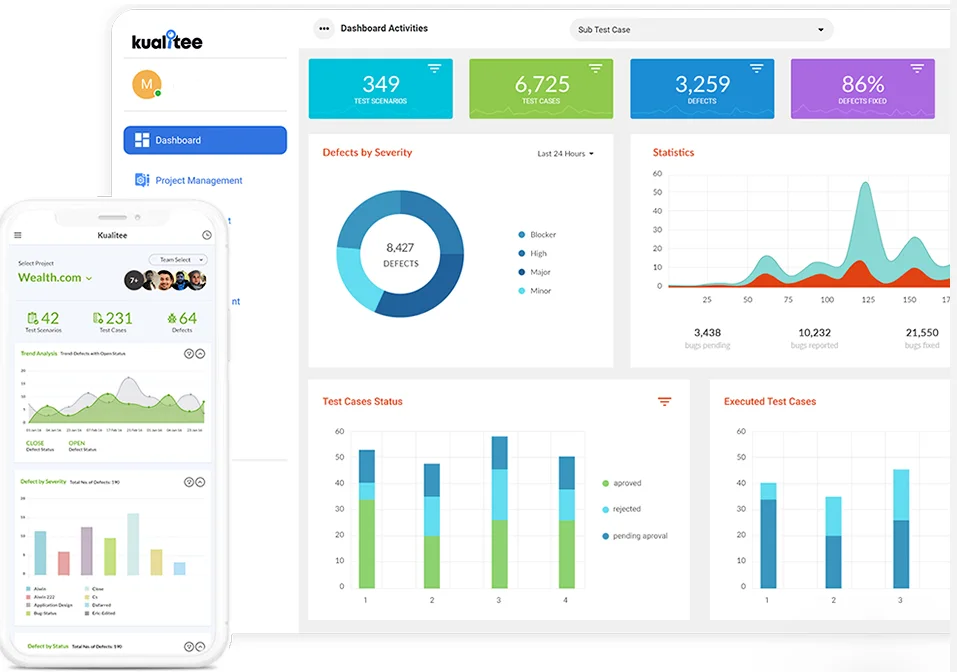
Drawbacks:
- Setting up the test case suite can be labor intensive and requires a specific numbering system.
- The user interface could be improved, and some features can be slow to respond.
- Has a steep learning curve, especially for new users.
- Mobile app offers limited features and needs improvement.
- Performance can lag when handling large datasets.
- Data migration into the platform may be difficult.
- Automation integrations are not always seamless and may require manual effort.
- Lacks some advanced features needed for complex test management.
- Pricing could be high for smaller teams or projects.
Pricing:
- The pricing for Kualitee is based on the number of users and the deployment method. As an example, for cloud deployment, the cost is $150 per month or $1620 per year for 10 users. For on-premise deployment, the cost is $2920 per year for 10 users.
Platform:
- Kualitee supports cloud and on-premise deployment across multiple platforms.
Customer ratings:
G2 reviews: 170, G2 rating: 4.5
Capterra reviews: 20, Capterra rating: 4.3
Features Valued by Users on Capterra or G2
- AI-driven test automation and management.
- Supports web, mobile, and API testing.
- Auto-healing tests for dynamic UIs.
- Parallel execution for efficiency.
- Integrates with CI/CD tools like Jenkins.
- Test flakiness detection and prioritization.
8. Selenium

Selenium is an open-source automation tool for testing web applications in browsers. It supports multiple programming languages, including Java, Python, C#, and JavaScript. Selenium allows testers to write scripts that mimic user actions such as clicking, typing, and navigating pages. It works across major browsers like Chrome, Firefox, Safari, and Edge.
The platform includes several components: Selenium WebDriver, Selenium IDE, and Selenium Grid. WebDriver is used for browser automation. The IDE is a browser extension for recording and editing tests. Selenium Grid lets you run tests in parallel across different environments. Selenium is widely used because of its flexibility and support for CI/CD pipelines. However, it only supports web applications, but it remains a popular choice for developers and QA teams looking for customizable browser automation.
- Supports Multiple Browsers - compatible with Chrome, Firefox, Safari, Edge, and Internet Explorer.
- Allows test creation in Java, Python, C#, Ruby, and other languages.
- Open Source Tool available with frequent updates from contributors.
- CI/CD Friendly - connects easily with tools like Jenkins, Maven, TestNG, and JUnit.
- Offers various bindings, extensions, and integrations for modern workflows.

Drawbacks:
- Has a steep learning curve, especially when using third-party tools.
- Lacks built-in features beyond test automation.
- Only handles testing; it doesn’t support development or test optimization.
- Offers no official customer support—users rely on the community.
- Requires third-party tools for common features like reporting and image comparison.
- Cannot automatically improve or optimize test cases over time.
- Manual scripting is time-consuming and hard to scale.
- Developers may only write a few test scripts per day using Selenium.
- Slower than AI-based tools that generate and run tests automatically.
- The open-source nature leads to slow updates and competing development priorities.
- No unified roadmap or core team behind its long-term evolution.
Pricing:
Selenium is completely free and open-source, with no licensing costs.
Platform:
Selenium runs on Windows, macOS, and Linux, and supports major browsers through WebDriver integration.
Customer ratings:
G2 reviews: 130, G2 rating: 4.2
Capterra reviews: 15, Capterra rating: 4.4
Features Valued by Users on Capterra or G2
- Automates web browsers across platforms.
- Supports Java, Python, C#, and more.
- Cross-browser testing (Chrome, Firefox, Safari).
- Parallel test execution via Selenium Grid.
- Integrates with CI/CD tools like Jenkins.
- Handles complex interactions (keyboard, mouse)
9. Cypress
.png)
Cypress is a front-end automation tool built for modern web apps. It runs tests directly in the browser for accurate and fast results. Cypress supports any front-end framework like React, Angular, or Vue. It uses a unique architecture that runs tests in the same loop as the app. This ensures stable and reliable tests. Cypress is open-source and easy to set up. The syntax is simple, using JavaScript. It shows detailed logs and screenshots during test runs. Cypress Cloud adds advanced features like test history, analytics, and CI integration. It helps teams debug failures and speed up development. The tool fits easily into CI/CD pipelines. Cypress is ideal for developers who want fast, visual, and dependable testing.
- In-Browser Test Execution - Runs tests directly inside the browser.
- Multiple Test Types - Supports end-to-end, integration, component, and API testing.
- JavaScript-Based
- Fast Debugging - Offers time-travel debugging, readable error messages, and real-time feedback.
- Automatic Waiting - Automatically waits for elements to appear.
- Live Reloads - Re-run tests automatically as code changes.
- Simple Setup
- CI/CD Integration
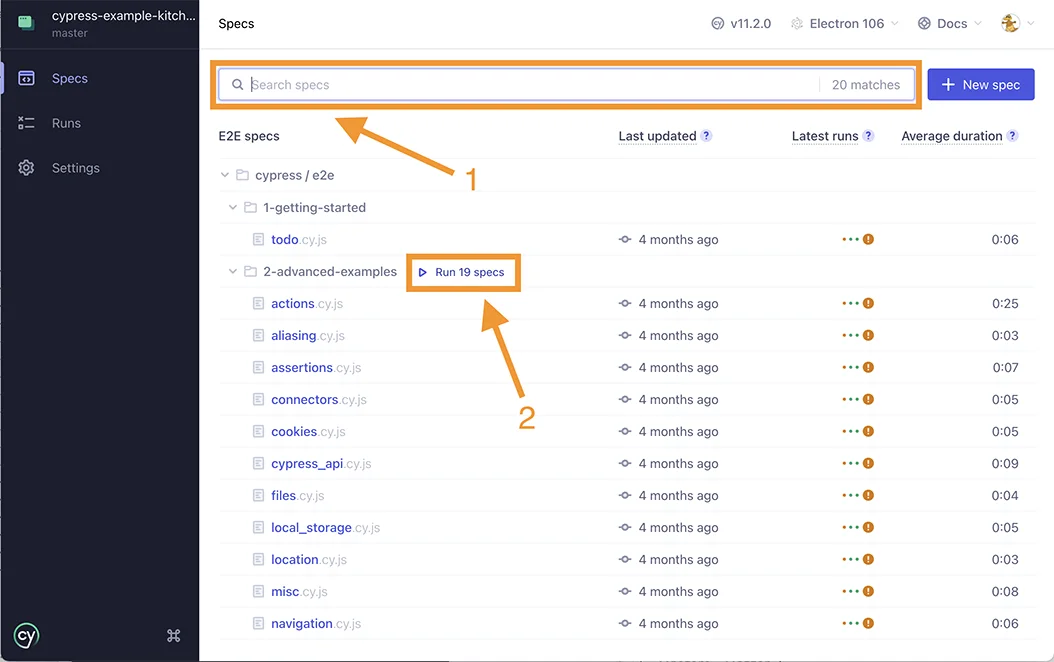
Drawbacks:
- Limited to JavaScript, which may not suit teams using other languages.
- No support for testing on real mobile devices.
- Doesn’t handle multiple tabs or browser windows well.
- Cross-browser support is limited and can be unreliable outside Chrome.
- Not ideal for large-scale testing projects due to architecture limits.
- Can show inconsistent results across different browsers like Firefox.
- Requires a learning curve, especially for testers new to JavaScript.
- The Cypress dashboard can be less intuitive for managing large test suites.
Pricing:
Cypress offers a free open-source plan, while paid plans begin at $67/month for teams. The Business plan, starting at $267/month (billed annually), includes support for 50 users, 120,000 test results, and advanced features like spec prioritization, auto cancellation, SSO, and enterprise Git integrations.
Platform:
Cypress supports testing on Windows, macOS, and Linux, with seamless integration into modern CI/CD pipelines.
Customer ratings:
G2 reviews: 105, G2 rating: 4.7
Capterra reviews: 67, Capterra rating: 4.7
Features Valued by Users on Capterra or G2
- Real-time test reloading for instant feedback.
- Automatic waiting for commands/assertions.
- Time-travel debugging for test inspection.
- Stubs and controls network requests.
- Cross-browser testing for modern browsers.
- Integrates with React, Angular, Vue.
10. Applitools

Applitools is an AI-based visual testing tool for web and mobile apps. It uses Visual AI to spot visual issues across pages, browsers, and screen sizes. The platform mimics how users see, catching UI bugs that code-based tests might miss. It reduces manual work by automating test maintenance and filtering out false positives. Applitools works with major testing frameworks and CI/CD tools, fitting into existing workflows. Tests run faster, cover more, and need less upkeep. It supports teams of all skill levels. The tool helps find issues early and speeds up release cycles without sacrificing quality.
- Functional and Visual Regressions
- AI-Powered Intelligent Automatic Test Maintenance - employs AI to automatically maintain tests and reduce manual effort.
- Smart Assist for Test Improvement Suggestions - Applitools' Smart Assist feature provides intelligent suggestions to enhance tests.
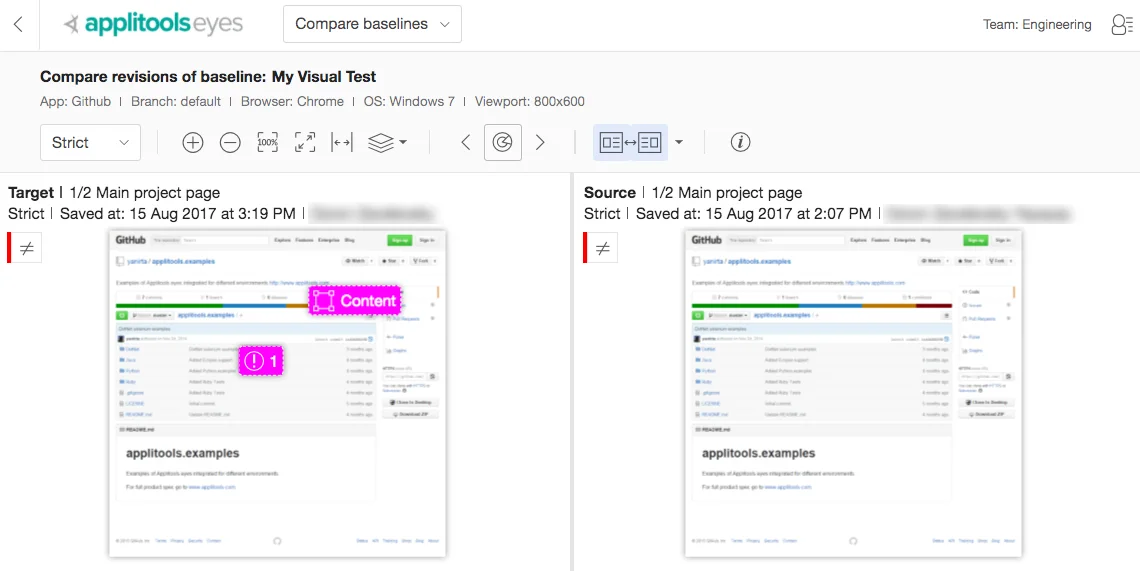
Drawbacks:
- The platform has a steep learning curve, especially for new users.
- Initial setup can be complex and time-consuming.
- The user interface can be hard to navigate when dealing with many test cases.
- It may be expensive for smaller teams or limited budgets.
- Some features are not intuitive and require extra time to understand.
- Documentation can be unclear or incomplete in certain areas.
- Integrating Applitools into existing workflows may take effort.
Pricing:
Applitools offers flexible pricing based on team size and testing needs. A 14-day free trial is available with 25 autonomous tests and unlimited executions. The Starter plan costs $969 per month (billed annually) and includes 50 autonomous tests, Visual AI, cross-browser testing, and CI/CD integration. Enterprise plans offer custom pricing with 100+ tests and advanced support options.
Platform:
Applitools runs on the cloud and supports integration with web, mobile, and desktop testing environments.
Customer ratings:
G2 reviews: 60, G2 rating: 4.4
Capterra reviews: 30, Capterra rating: 4.6
Features Valued by Users on Capterra or G2
- Visual AI for detecting UI regressions.
- Cross-browser and cross-device testing.
- Self-healing tests reduce maintenance.
- Accessibility and performance testing.
- Integrates with Selenium, Cypress, Jenkins.
- Visual diff reports for easy analysis.
11. Mabl
Mabl is a test automation platform for web and API testing. It supports low-code test creation with optional JavaScript for advanced logic. Tests can run across different stages of the development lifecycle. Mabl uses machine learning to reduce test maintenance and automatically update broken tests. It integrates with CI/CD tools like Jenkins, GitHub, and Bitbucket. Users can run functional, end-to-end, and performance tests in the cloud. The platform also includes visual testing and cross-browser support. Test results are easy to review with built-in reporting and analytics. Mabl is delivered as a SaaS product, with no local setup required. It helps teams run consistent tests and catch issues before release.
- Low-Code Test Capability
- Intuitive Intelligence and Automated Healing
- Mabl supports data-driven testing that enables the creation of real-life test cases based on actual data.
- Comprehensive End-to-End Testing via APIs
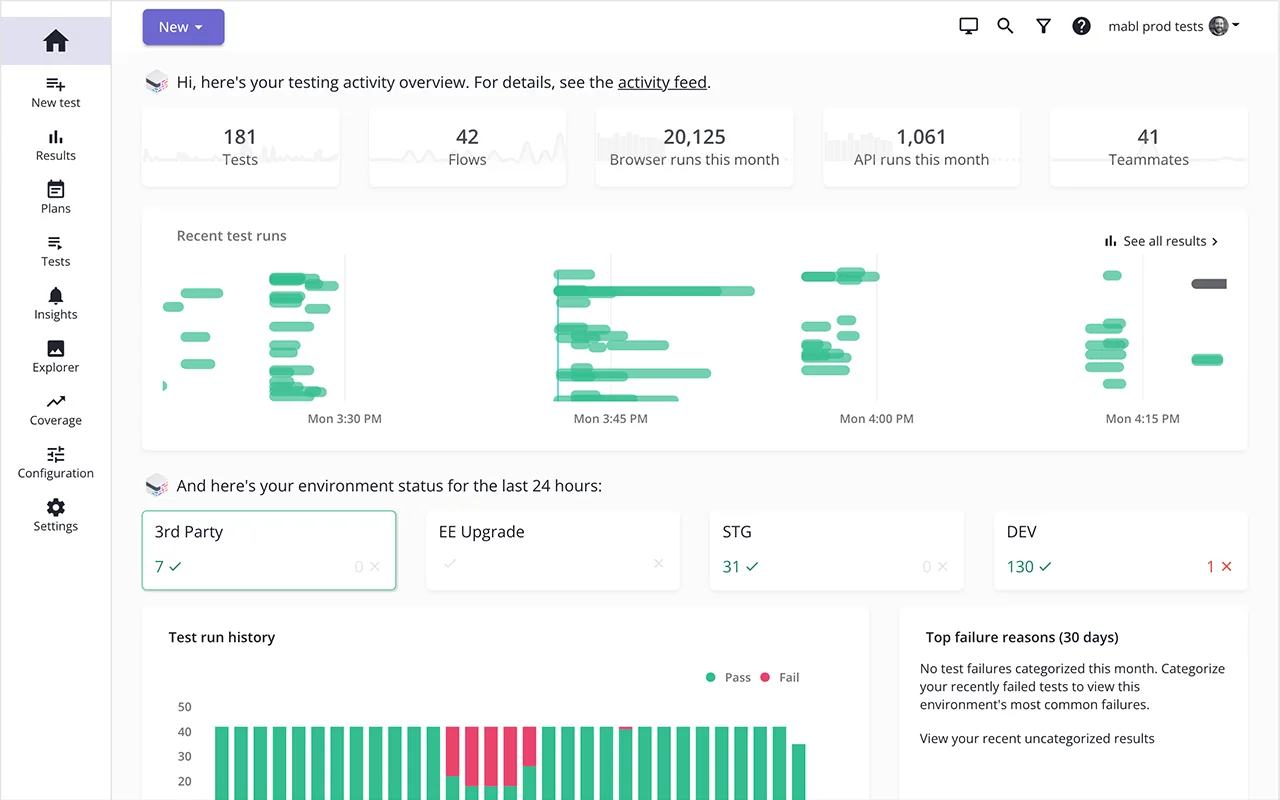
Drawbacks:
- Mabl does not support testing desktop applications.
- Cloud test runs can be slow.
- Local runs have some limitations.
- API testing features are limited.
- The platform can be expensive for some teams.
- Occasional glitches in the interface affect usability.
- Users cannot always define their own selectors.
- Some features and reporting options are missing.
- Documentation can lack detail in certain areas.
Pricing:
Mabl offers pricing upon request.
Platform:
Mabl is a cloud-based platform that runs on all major browsers and integrates with CI/CD pipelines.
Customer ratings:
G2 reviews: 37, G2 rating: 4.5
Capterra reviews: 67, Capterra rating: 4.0
Features Valued by Users on Capterra or G2
- Low-code test creation for all users.
- Auto-healing tests for dynamic apps.
- Supports web, mobile, API, and performance testing.
- Data-driven testing for scalability.
- CI/CD integration with Jenkins, GitHub.
- Unified platform for end-to-end testing.
12. Sauce Labs

Sauce Labs is a cloud-based testing platform for web and mobile applications. It allows teams to run automated tests across multiple browsers, operating systems, and devices. Users can test on real devices or virtual machines to check functionality and compatibility. The platform supports frameworks like Selenium and Appium. Sauce Labs fits into CI/CD workflows and helps monitor test performance over time. It offers reporting tools to review test outcomes and identify issues. The platform supports both manual and automated testing, including mobile app testing. Teams use it to ensure consistent behavior across environments.
- Intelligent Test Management - The platform’s NLP engine automatically creates test cases, scripts, and data.
- Low Code Automation
- Deep-Learning Capabilities

Drawbacks:
- Initial setup can be time-consuming and complex.
- It requires configuration to integrate with existing CI/CD pipelines.
- Learning the platform takes time, especially for teams new to automated testing.
- Frequent test maintenance is needed when app changes cause failures.
- Automating dynamic test cases can be difficult.
- The platform may be costly for small teams or projects.
- Advanced features may require technical expertise.
- Occasional test failures can happen due to small issues.
Pricing:
Sauce Labs offers three pricing plans based on testing needs. The Live Testing plan starts at $39/month (billed annually) and supports manual testing on browsers and mobile devices. The Virtual Cloud plan starts at $149/month (billed annually) and includes automated and manual testing using emulators and simulators. For teams needing real device testing, the Real Device Cloud plan starts at $199/month (billed annually).
Platform:
Sauce Labs is a cloud-based testing platform for web and mobile applications across browsers, devices, and operating systems.
Customer ratings:
G2 reviews: 170, G2 rating: 4.3
Capterra reviews: 31, Capterra rating: 4.5
Features Valued by Users on Capterra or G2
- Tests on 700+ browser/OS combinations.
- Real device testing for iOS and Android.
- Parallel test execution for speed.
- Sauce Connect for secure firewall testing.
- Integrates with Selenium, Appium, Jenkins.
- Live breakpoints for debugging.
13. Postman

Postman is a software testing tool that provides a streamlined process for standardizing API testing. Offering a comprehensive feature set, it enhances workflows and identifies issues throughout the API lifecycle. Users can construct collections for thorough API testing, utilizing tools like a JavaScript-based library with code snippets. Once organized, tests within these collections can be seamlessly automated through the Postman web app, application, or the Postman CLI. Postman supports many HTTP methods like GET, POST, PUT, DELETE, and PATCH. It handles different data formats such as form-data, URL-encoded, raw, and binary. It offers multiple authentication options like API keys, OAuth, and Basic Auth. Postman converts API requests into code snippets for languages like JavaScript and Python. It lets users save environments for easy switching between setups.
- Conducts variable-supported tests across diverse environments or configurations.
- CI/CD Integration for early issue detection
- Monitor API performance for usage and trend insights.
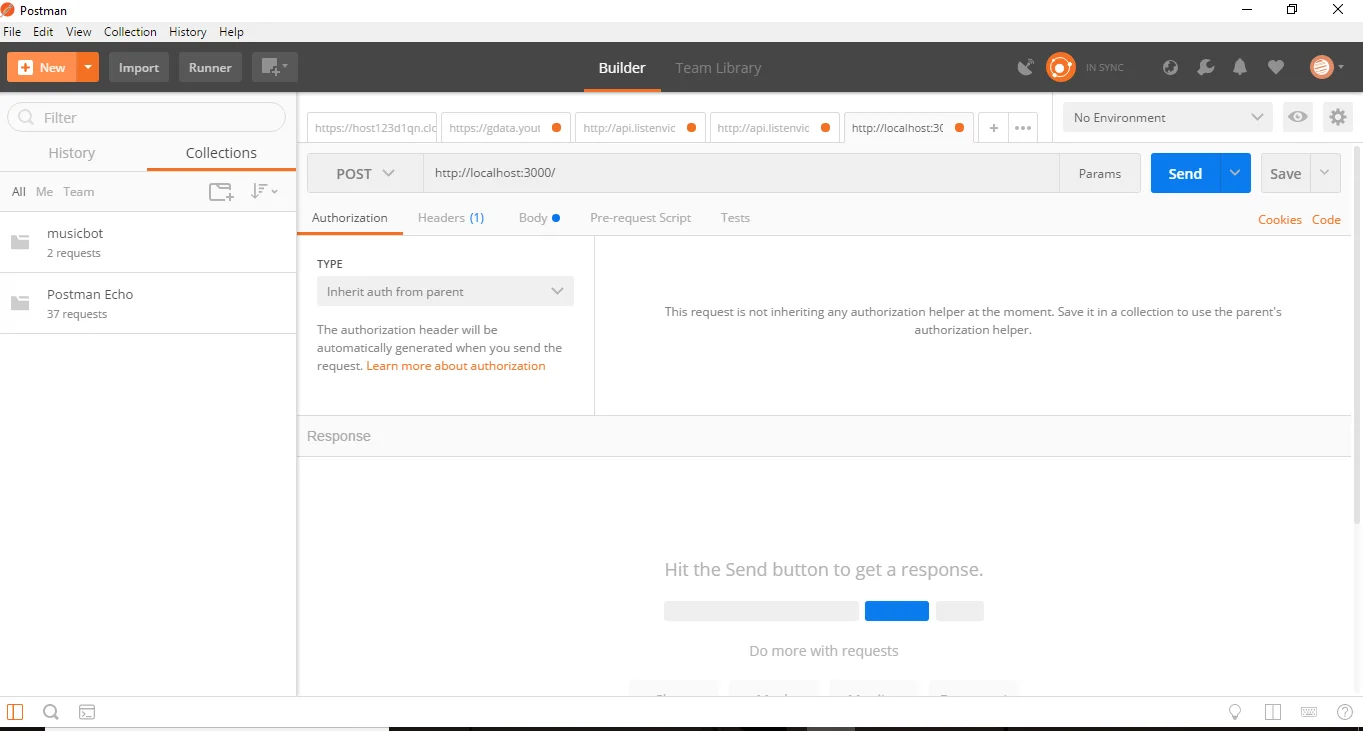
Drawbacks:
- It can be slow, especially on lower-end machines or with large collections.
- The app may freeze or crash at times, requiring restarts.
- The licensed version can be expensive for some users or larger teams.
- Some features depend on the cloud, which may not suit all teams.
- Frequent updates can introduce minor bugs.
- Customer support may not meet expectations.
- The login process can be inconsistent or buggy.
- Older request history is not easily accessible in the desktop app.
Pricing:
Postman offers tiered pricing based on team size and features. The Free plan supports up to 3 collaborators and includes basic testing tools. The Basic plan starts at $14/user/month (billed annually) and adds more collaboration, monitoring, and recovery features. The Professional plan, at $29/user/month, includes private workspaces, partner access, and more recovery and API limits. The Enterprise plan is $49/user/month and adds advanced controls, reporting, security features, and larger usage limits. Add-ons like Postbot, Flows, and Collection Runner are available at extra cost.
Platform:
Postman is a cloud-based API development and testing platform with desktop and web app access.
Customer ratings:
G2 reviews: 1242 G2 rating: 4.6
Capterra reviews: 497, Capterra rating: 4.7
Features Valued by Users on Capterra or G2
- Automated API testing for REST/GraphQL.
- Environment variables for multi-environment testing.
- Collaboration via workspaces and collections.
- API documentation and mocking tools.
- CI/CD integration with Jenkins, GitHub.
- Security and governance features.
14. Cucumber

Cucumber is a popular open-source testing framework that enables behavior-driven development (BDD) for software projects. It allows teams to write executable specifications in plain text, using a simple syntax called Gherkin. These specifications serve as living documentation that can be easily understood by both technical and non-technical stakeholders.
Cucumber can execute tests across different programming languages like Java, JavaScript, and Ruby. It integrates well with existing development workflows and helps teams validate that features work as intended. Cucumber was first built in Ruby but now has cross-language support.
- Behavior-Driven Development (BDD)
- Gherkin Syntax
- Step Definitions
- Data Tables and Scenario Outlines
- Integration
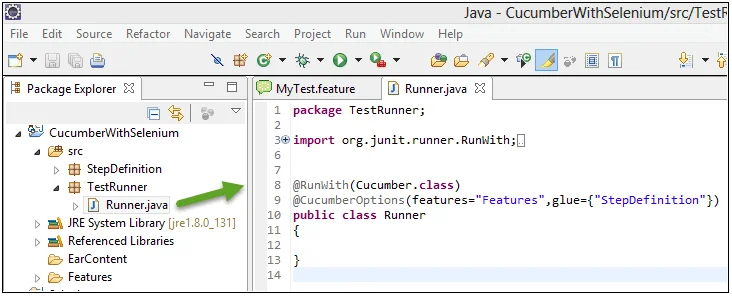
Drawbacks:
- Setting up Cucumber tests can be complex, especially for teams new to BDD or Gherkin.
- Gherkin syntax may take time to learn and can slow down early adoption.
- Tests need frequent updates when features or requirements change.
- Debugging Cucumber tests can be difficult, especially with complex steps.
- It often depends on tools like Selenium or Appium, adding more setup and maintenance work.
Pricing:
Cucumber has not provided pricing information.
Platform:
Cucumber is an open-source BDD framework.
Customer ratings:
G2 reviews: 37, G2 rating: 4.1
Features Valued by Users on Capterra or G2
- Gherkin-based test scripts in plain English.
- Supports collaboration across teams.
- Data-driven testing with Scenario Outline.
- Reusable step definitions for efficiency.
- Integrates with Selenium, Java, Ruby.
- Multi-language support for global teams.
Best Software Testing Tools Selection Criteria and Methodology
The process of selecting the best software testing tools featured in this guide involved a comprehensive evaluation based on multiple criteria. Our goal was to provide a diverse selection that addresses various testing needs, from unit testing to end-to-end testing across different platforms and domains, including functional, performance, security, and more. The following factors played a crucial role in the selection process:
Testing Domain Coverage
Each tool was assessed for its ability to address specific testing requirements, such as:
- Unit testing for individual components
- Integration testing for system interactions
- API testing for backend services
- Web and mobile testing for user interfaces
- Performance testing for system efficiency
- Security and vulnerability testing for compliance Priority was given to tools that offer comprehensive coverage for the intended testing domains, ensuring they can handle the diverse needs of modern software development projects. This evaluation was based on customer testimonials, documented use cases, and official documentation, ensuring real-world applicability.
Popularity and Community Support
Tools with a strong user base and widespread adoption were prioritized to ensure reliability and ongoing support. Specifically:
- Each tool had to have received evaluations from at least 12 satisfied users across various review platforms, such as G2, Capterra, or TrustRadius, with a total rating of 4 or higher.
- Tools with active communities, comprehensive documentation, and reliable support channels (e.g., forums, customer support) were favored to provide users with resources for troubleshooting and learning.
- Vendor reputation was considered, as reputable vendors often deliver consistent updates and robust support, enhancing long-term usability.
Features and Functionality
The evaluation focused on the richness of features provided by each tool, prioritizing those with robust capabilities, including:
- Automated test creation and execution to streamline testing processes
- Support for multiple testing frameworks and programming languages for flexibility
- Parallel test execution to reduce testing time
- Test flakiness detection and reporting to improve reliability
- Integration with bug tracking and project management tools (e.g., JIRA, [Azure DevOps “
User-Friendly Interface
Tools with intuitive interfaces and streamlined workflows were prioritized to ensure accessibility for both novice and experienced testers. Key considerations included:
- Accessibility for users with varying technical expertise, including support for low-code or no-code test creation where applicable
- Clear and comprehensive documentation to facilitate onboarding
- Availability of tutorials and training resources to support learning
- Streamlined setup and configuration processes to minimize initial barriers User reviews on platforms like G2 and Capterra were analyzed to confirm ease of use, ensuring tools are practical for diverse teams.
Scalability
The ability of tools to support projects of different sizes was a critical factor. Tools were evaluated based on:
- Their capacity to handle large test suites and complex applications
- Support for distributed testing environments and cloud-based infrastructure
- Suitability for both small teams and large enterprises with diverse testing needs Scalability was assessed using “Company Size” data from G2, ensuring tools could accommodate startups, mid-sized companies, and large organizations.
Integration Capabilities
Seamless integration with other tools in the software development lifecycle was essential. Key integrations included:
- Continuous Integration/Continuous Deployment (CI/CD) tools like Jenkins, GitLab CI, or GitHub Actions
- Version control systems such as Git, GitHub, or Bitbucket
- Bug tracking and project management tools like JIRA, Azure DevOps, or Trello
- Cloud platforms like AWS, Azure, or Google Cloud
- Other testing tools or frameworks for comprehensive testing coverage Integration capabilities were verified through official documentation and user feedback, ensuring compatibility with modern DevOps workflows.
Cost-Effectiveness
While cost was not the sole determinant, it was evaluated in the context of the value provided. This included:
- Analysis of licensing models, subscription fees, and open-source options
- Consideration of training and maintenance costs as part of the total cost of ownership
- Balancing cost against features, ensuring affordability without compromising functionality Both commercial and open-source tools were considered, with an emphasis on delivering high value for the investment, as highlighted in user reviews and pricing details from vendor websites.
Advancements and Updates
Tools that are actively developed and regularly updated were prioritized to ensure relevance in the rapidly evolving software testing landscape. This included support for:
- Emerging technologies like microservices and containerization (e.g., Docker, Kubernetes)
- Modern testing methodologies, such as AI-driven automation and behavior-driven development (BDD)
- Security patches and performance improvements to address new challenges Active development was confirmed through vendor release notes, community contributions, and update frequency, ensuring tools remain future-proof.
The combination of these criteria led to the selection of the software testing tools featured in this guide. There was no sponsorship involved, and the evaluation relied on objective analysis of user feedback, expert reviews, and real-world applicability. By adhering to these criteria, the selected tools offer a balance of functionality, usability, and innovation, making them suitable for a wide range of testing scenarios in 2025 and beyond. This rigorous process ensures readers have a reliable resource for choosing the best software testing tools for their projects.
Conclusion
These leading software testing tools can cater to a variety of rigorous demanding, standing up to the needs of modern development environments and providing cutting-edge features that can legitimately take testing and test automation to the next level.
- The top software testing tools blend AI, automation, and cloud technology for faster, smarter QA.
- Self-healing and low-code features reduce maintenance and boost test reliability.
- Seamless CI/CD integration enables continuous testing and rapid feedback.
- Each tool offers unique strengths, from Functionize’s AI testing to Selenium’s flexibility.
- Choosing the right mix helps teams scale efficiently and deliver high-quality software.






